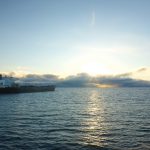By Andrés Morales
Alyeska’s Emergency Preparedness and Response Director

To read more, head to
alyeska-pipe.com’s Memories and Mileposts
I first came to the Valdez Marine Terminal on a tanker in 1984 as I was just starting my chosen career in the maritime industry. It was winter. It was the most stunning place I have ever sailed to and remains vivid in my memory. The VMT appeared to be carved from a mountain in the raw wilderness. We loaded our cargo into tanks larger than cathedrals. It was a place out of time; I had never seen anything like it. Once full, we sailed out into Prince William Sound: a place of unrivaled beauty.
When I heard about the Exxon Valdez oil spill, I was sailing in the mid-Pacific. I had been at sea continuously for more than a year. I remember the feelings of rage, sadness, and horror at the thought of a cargo of crude in those pristine waters. I returned home in April and shared a house with two other seamen; none of us could believe what had happened. It was unthinkable at the time. The images and stories from that time linger in my memory, and I know that many in our Alaska community feel the impacts still to this day.
From that catastrophe came global change. Tankers worldwide are now double-hulled and there are comprehensive training and verification standards for crews. Despite an increase in crude cargos, the rate and severity of tanker spills has dropped more than 10-fold. And 33 years later, at the epicenter of that terrible event, is one of the largest comprehensive prevention and response operations in the world, the Ship Escort Response Vessel System: SERVS.
The equipment and training here are purpose-built and world-class and our people are capable and passionate protectors of Prince William Sound. I am proud to lead a team with this mission and ownership. And that ownership fosters a culture of continuous improvement; we must work every day to be better and learn from where we have been. It’s not enough to prepare for the incidents of the past; we must anticipate and prepare for new – unthinkable – risks.
And even as we march forward with progress, we must never forget the lessons and tragedies of 1989. Those images that still linger are a powerful motivation to do everything in our power to prevent oil spills, and be ready to respond aggressively if the unthinkable happens.